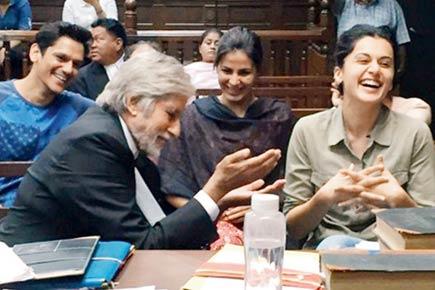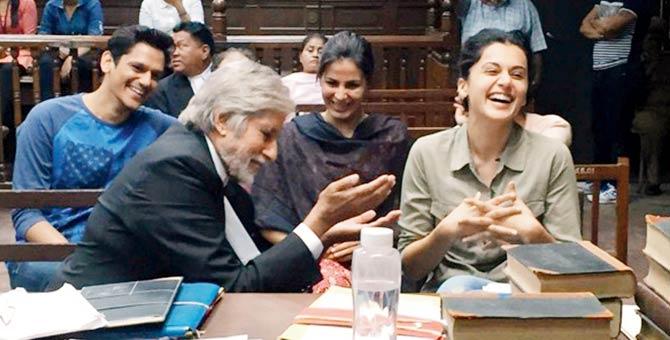I haven’t yet managed to see Aniruddha (“Tony”) Roy Chowdhury’s Pink, co-produced by Shoojit Sircar


A still from Aniruddha Roy Choudhury’s Pink
ADVERTISEMENT
 I haven’t yet managed to see Aniruddha (“Tony”) Roy Chowdhury’s Pink, co-produced by Shoojit Sircar. I’ve been busy with back-to-back screenings in Mumbai for the Berlin and Dubai film festivals with Dorothee Wenner, the festivals’ South Asia programmer. But I’m keen to catch it. Even without seeing it, it is fascinating how the film seems to have divided critics gender wise — top women critics have largely welcomed it, top male critics have generally criticised it.
I haven’t yet managed to see Aniruddha (“Tony”) Roy Chowdhury’s Pink, co-produced by Shoojit Sircar. I’ve been busy with back-to-back screenings in Mumbai for the Berlin and Dubai film festivals with Dorothee Wenner, the festivals’ South Asia programmer. But I’m keen to catch it. Even without seeing it, it is fascinating how the film seems to have divided critics gender wise — top women critics have largely welcomed it, top male critics have generally criticised it.
The film is about three young, working women flatmates in Delhi. Following a rock concert, a creep, Rajveer (Angad Bedi), tries to molest Minal (Taapsee Pannu), who retaliates by hitting him with a bottle. Creep and his buddies take revenge by abducting and assaulting Minal. When the girls register a case with the police, Creep slaps multiple counter charges on the girls, including attempt to murder and makes allegations that they are prostitutes. A deeply patriarchal society, including the police and a politician relative, connive to threaten and assault the women, while encouraging Neanderthal Indian men in their perceived ‘entitlement’ to use women as sex objects.
I couldn’t help thinking of Iranian director Asghar Farhadi’s absolutely stunning new film The Salesman (Forushande) on almost exactly the same subject — of women’s violation and the contrast in how men and women react to it. It won Best Screenplay for Farhadi and Best Actor for Shahab Hosseini, at the Cannes film festival this year. The film explores how a marriage falls apart after the wife, Rana (Taraneh Alidoosti), is violated by an intruder in her home, when her husband Emad (Shahab Hosseini) is out. What is fascinating, is that after being violated, the woman wants to forgive her rapist and just move on, but the newly-macho husband, feeling even more violated than his wife, wants revenge by humiliating the rapist. Even when the wife is violated, it’s still about him. Imagine, their marriage crumbles not so much over the violation per se, as on the question of forgiveness. And fake honour. Farhadi is a master of suspense, making elements like murder, whodunit and whydunit seem passé. The film is a thriller of emotions, of shifting feelings in the hearts of his protagonists, that leave you on the edge of your seat. It is extraordinary how the Iranians grapple with their censors — who have largely stifled their finest directors, including Jafar Panahi and Mohsen Makhmalbaf — and still turn out enthralling family dramas.
The film explores the nuances that constitute rape, especially non-penetrative rape — we never know exactly what the violation was, which happens off-screen, and is clearly horrific. Rana opens the door on hearing her intercom buzzer, then goes into her shower. Later, she remembers that somebody touched her hair — she thought it was her husband — until she saw the intruder’s hands, but she cannot remember anything more. Finding her bloodied and gashed in the head, the neighbours rush her to the hospital. In the climax, it seems unlikely the marriage will survive, as the wife walks out on her husband. For him, it’s about honour revenge, for her it’s about honour forgiveness.
The use of the play Death of a Salesman, in which the protagonists also act, is somewhat contrived, but it would be curmudgeonly to carp. It would be great if the film could be seen at the Mumbai Film Festival and other Indian film
festivals as well. MAMI already has Konkona Sensharma’s A Death in the Gunj, a fine study of the horrific consequences of machismo. The Salesman would be a terrific counterpoint.
Meenakshi Shedde is South Asia Consultant to the Berlin Film Festival, award-winning critic, curator to festivals worldwide and journalist. Reach her at meenakshishedde@gmail.com
 Subscribe today by clicking the link and stay updated with the latest news!" Click here!
Subscribe today by clicking the link and stay updated with the latest news!" Click here!






